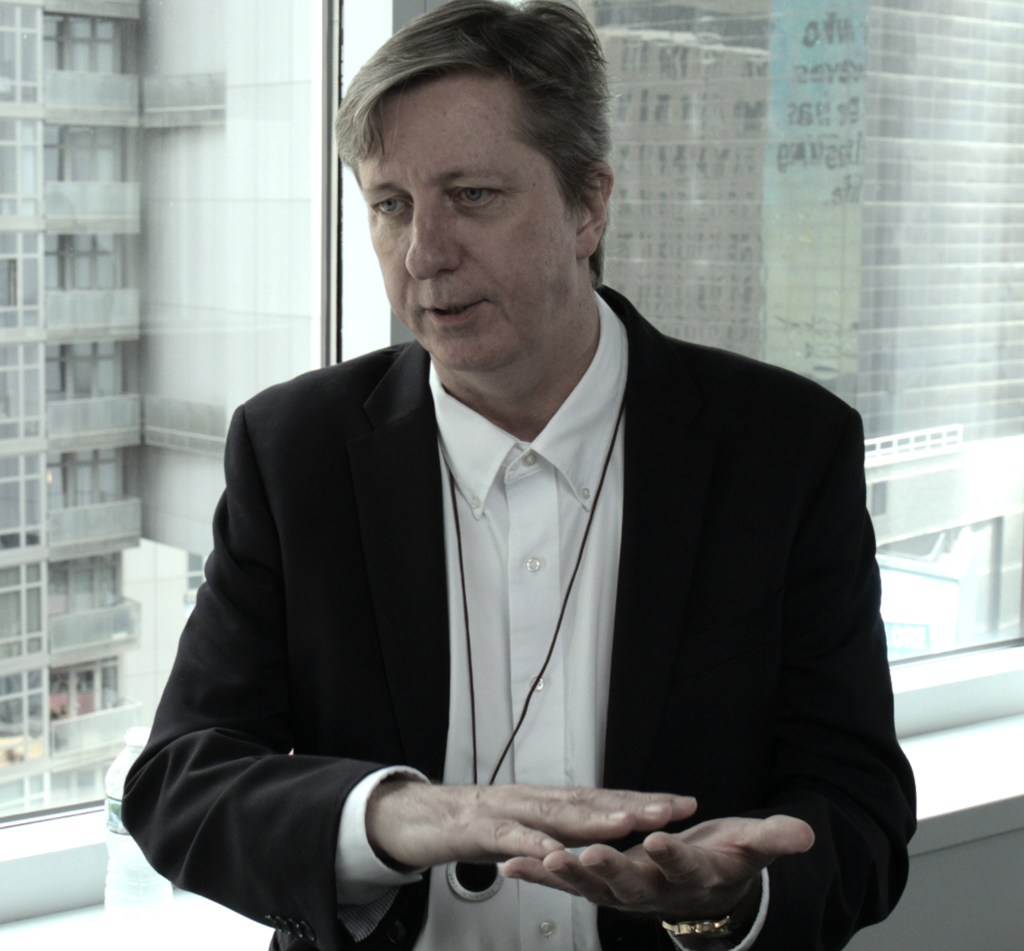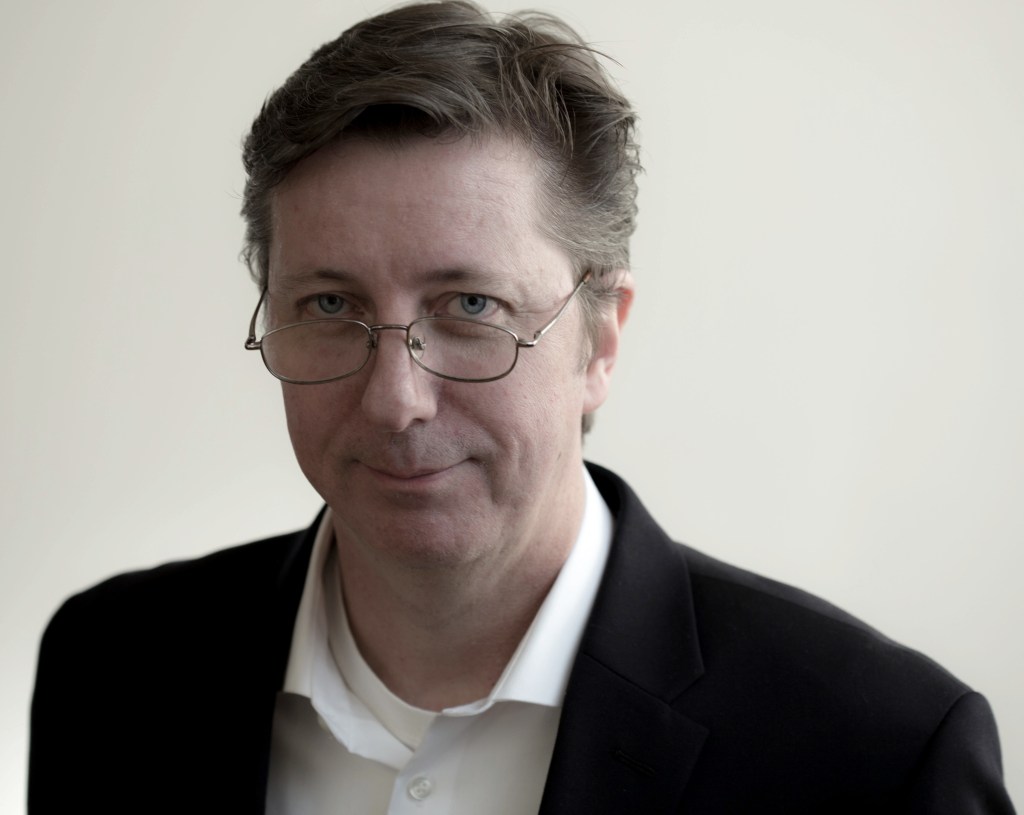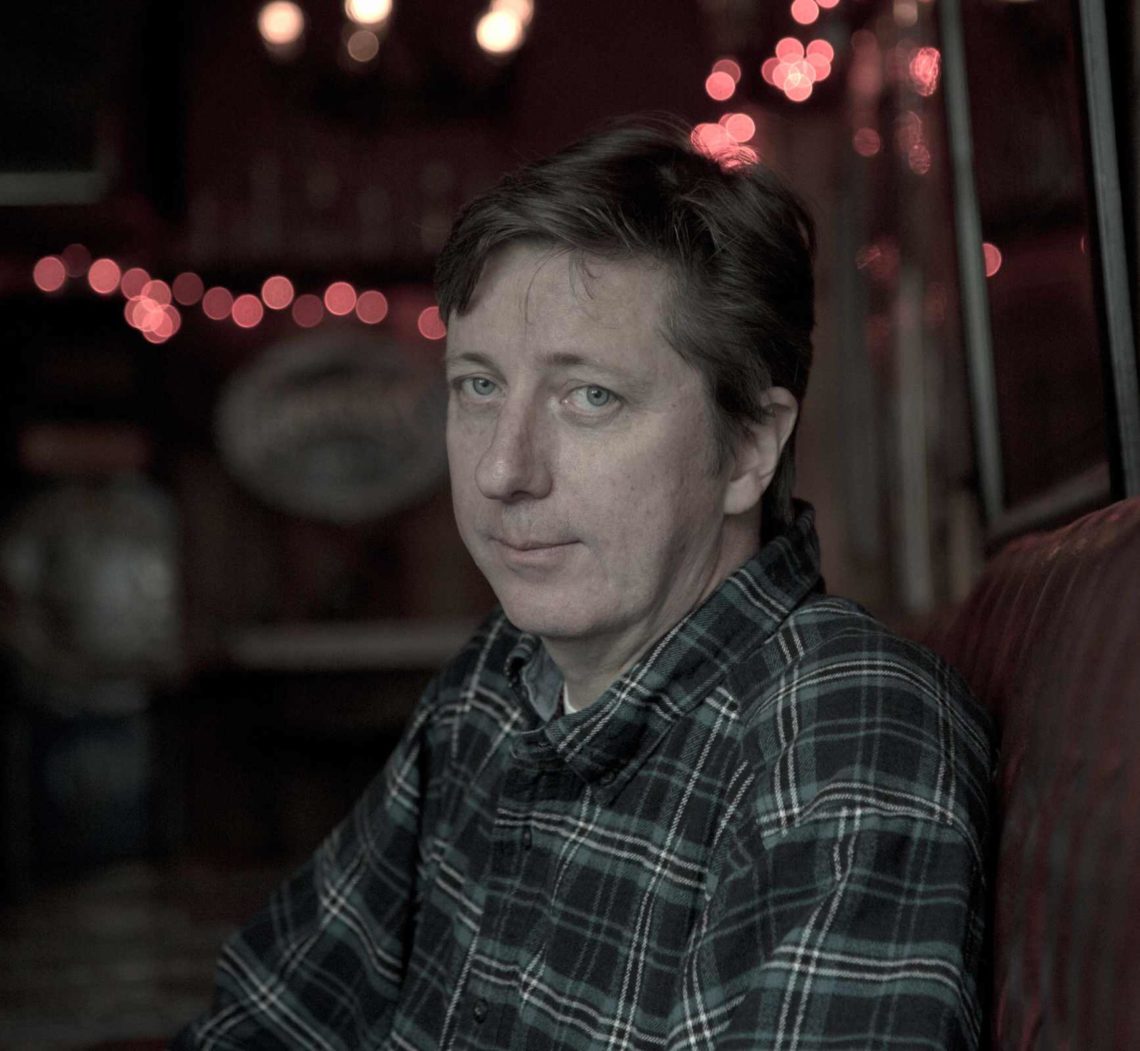This photo story is from the summer 2025 issue of VICE magazine, THE REASONS TO BE CHEERFUL ISSUE. Get four issues each year, sent straight to your door, by subscribing here, or pick up the summer issue as one-off purchase here.
Hal Hartley’s films are full of sad, frustrated, sensitive people who are all too intelligent for their own good, desperately trying to articulate feelings they wish they didn’t have.
Rather than shooting for the clipped, super-naturalistic dialog that is a kind of holy grail for most directors, Hartley instead winches his characters from scene to scene so that they can deliver long, perfectly crafted deadpan monologues to each other. (Many are the kind of person you feel you might like to be yourself, if only you had the time.) His films are absurd and romantic in the same way that being teenage is absurd and romantic; those enchanted years of getting absorbed in yourself and others, longing for a knottier life because you have no idea yet just how knotty life will become.
The American director, a native New Yorker, is a true one-off, something that has only become clearer as more and more years have passed since his cinema debut (Kid, 1985) in which his work has steadfastly refused to negotiate with time or the zeitgeist. He writes his own alt-rock soundtracks for his films. He directed a couple of videos for Everything But The Girl. If you’ve never seen his movies, you might have seen a clip of three people dancing to “Kool Thing” by Sonic Youth (Simple Men, 1992) in an homage to a similar scene in Godard’s Bande à part. He writes books and over the years has accumulated a cadre of regular actors, including Adrienne Shelley, Parker Posey, Robert John Burke, Martin Donovan, Edie Falco, and Elina Löwensohn.
A Gen Xer, his films never quite wore the insignia of that era ostentatiously enough for him to be swept along in nostalgic culture-industry retreads. Instead, he has loitered at the periphery, though given the context this is starting to look like an advantage. In an age of brain-lacerating tech and herdlike algorithmic group-think, Hartley stands out in ever-greater contrast as a quietly intransigent auteur force, current trends conspiring to render his filmmaking on Where to Land—his first new picture for a decade—ever more singular, thoughtful, and otherworldly.
Though the term seems a touch too loud, he is one of life’s last heroes, and a living, breathing reason to be cheerful. It was only right that VICE called him up for a chat, mainly about his new film, in which a protagonist modeled closely on himself—a metropolitan semi-bachelor who directs ‘romantic comedies’ and has lots of beguiling friends—wrestles with the task of drawing up his last will and testament, to the shock of loved ones who assume he is dying.
VICE: When I start telling people why they should watch your films, I always say first that they are so unlike anything else. Do you conceive of yourself as an outsider?
Hal Hartley: I think I knew it instinctually when I was beginning, back in the late 80s. As I made the second film and the third and the fourth and the fifth, I knew that I was delivering something for people to consider that was different in a lot of ways. I wanted to entertain, I wanted to be thoughtful, I wanted people to think and be engaged in a way that was different from other types of more mainstream entertainment.
You make certain assumptions, when you’re an artist, about who your audience might be. And you have to assume that the people who are gonna dig your work are kind of like you, but different. For instance, in my case, it’s generally people who like to read. Reading in a lot of senses has always been more of an influence upon what I do than filmmaking.

For me, the overriding impression of your films is characters who seem to be thinking out loud, but in a way that feels like pre-written speech.
Yeah, there’s a literateness. Even people who are not terribly literate characters, who are portrayed to be uneducated and naive, I try to render them in a way where the audience feels the artifice; you can feel what I’m trying to do. Say Fay Grim, Parker [Posey] is playing a single mom who probably doesn’t have a full high-school education but she’s so naturally smart and perceptive, and she gets involved in this stuff that not even the most educated of us can understand most of the time. [In the film, Posey’s character must track down and return notebooks full of unspecified kompromat to the CIA in exchange for her brother’s release from prison, transforming her from a single mother into a spy negotiating with terrorists.] I thought, ‘Now, that’s gonna be funny and moving.’
It’s seemed for years that all people have wanted to talk about is the impact of the internet on our ability to think clearly. In today’s distraction-economy environment, the thoughtful characters of Where to Land feel even more out of step and surreal, maybe, than your characters from 25 years ago.
I’ve always been anxious to have my characters be those kinds of people who really want to have a conversation. I began writing Where to Land late enough in my career that I didn’t really have to worry about how popular it was going to be. I really wanted to make something where people think out loud, that seriously, because that is the kind of world I live in. It’s not a fantasy; nothing in Where to Land is a discussion I haven’t had in one way or the other with friends…
Even the situation with your proxy’s would-be illegitimate child?
That’s a bit of a metaphor but yeah, that’s part of my experience. [laughs] I have a lot of these sort of ‘children’ out there who would sometimes have a real belief that I owe them something. It’s weird. I have musician friends, and they get it much more.
Do you mean overzealous fans?
Yeah, and there’s a line a fan sometimes crosses where it goes from admiration to something very, very personal to themselves, and it comes out like, ‘How dare you do that to me?!’ When I was a teen, a singer called Jackson Browne did something a little bit different, he got a little bit more electric, and people were heartbroken. Girls were crying and guys were throwing their records out the window.
“People your age and younger aren’t really aware of how similar the trends are now to Europe in the early 30s, and it’s very troubling.”
To what extent is Where to Land directly autobiographical?
Nothing’s literal except the fact that [like the film’s protagonist] I did have to make my will. The conversations with the lawyer had the same tenor. I came out of my lawyer’s office, saying, “That would make a hilarious story: a guy making his last will and testament who has to determine what he owns and who he wants to leave it to.” I don’t have a niece like Veronica, but I do have younger people of that ilk. I value it a lot because I never wanted to have children but I do want to be close to youth, to know what 30-year-olds are preoccupied with.
Have you detected any differences in the wiring of 30-year-olds versus people from your own generation?
We get into that pretty quickly in the middle of the film, with the 100-year-old lady, Elizabeth, and she’s saying, “It’s always technical, how we evolve.” I had this conversation with my dad before he passed on and he said when he was a kid, him and his grandfather—the oldest man in town—did pretty much everything the same way. They used the same tools, drove the same type of vehicles… but by the time me and my brothers were young men, there was this big gulf between his assumptions and ours. Now, it’s getting faster and faster as technology changes and adapts itself on a yearly basis. I’ve had conversations with friends who are 35 and 40 and they’re only five years apart, but they each have a totally different estimation of what their mobile device is supposed to do. I have right here a mobile device I bought in 2015 and then the cool thing was that they were small, right? When I was making the film, the younger actresses—Katelyn [Sparks], Aida [Johannes]—they used to introduce me to their friends on-set and say, “Hal, show them your phone!” So I just thought it was hilarious.
There can be so much information coming at one so fast that one can lose perspective. People your age and younger aren’t really aware of how similar the trends are now to Europe in the early 30s, and it’s very troubling. Some of us are older and lived with people who got through that, somehow. You know, the shifts towards the Trumps and Putins of the world… I’ve met well-intentioned, bright people, who are also bright about their electronics, and know how to access information. But they don’t really get the information; it just becomes a bunch of facts or events that happened in time. It feels like they don’t understand how close we are to a hundred years ago. That’s kind of what the 100-year-old philosopher in Where to Land is getting at.
She’s one of the most fascinating characters in the film, for sure.
I wanted to portray someone who thinks discursively—a bad word in most thinking now; you’ve gotta have a conviction immediately. Whereas I wanted to show someone who thinks fluidly, who comes at a subject from all kinds of angles, searching for the truth but not feeling the need to reach a conclusion, an ideology, too quickly. Really, what she’s doing there is acting out a non-ideological process of thinking.
In the film’s opening scene, the protagonist—who is playing a version of yourself—goes to a cemetery and asks about a job as a gardener there.
I was walking to the subway one day when I saw a guy doing that job. And it just moved me so much, I just said that it would be such a cool job to have. Your responsibilities are clear and there’s no negotiation involved: it’s taking care of nature.

Did you give any serious consideration to actually going into that line of work?
No, that’s probably what I was writing about in my notebook—“Don’t be sentimental; you can’t possibly think you could step out of your obligations and become a gardener.” I guess that’s part of what Where to Land is about: the impossibility of extricating yourself from the things that you have done. Other people, roughly my age, will tell me, “Hal, you cannot stop making films,” if I indicate that I have any desire to slow down.
How much time do you spend thinking about other people’s reaction to your work?
Not a lot. After doing it so long, I kind of learned that it doesn’t matter how much I think about it. For the most part, my films have always been against the grain of certainly popular expectations, and I worried about it a lot more in the early years—but ultimately it didn’t really seem to make much of a difference. I came away from thinking that people who like what I do seem to want to see me doing things my own way.
After 40 years of filmmaking have you developed any theories as to why you are as popular as you are? Why you occupy the space in the culture that you do?
I think I just don’t go away. [laughs] I’ve had critics—back in the 90s, people saying, “Why doesn’t he just stop and go away?!” I just don’t know how to do anything else with that degree of confidence. I have a cousin back home, who’s just a couple of years younger than me, and he’s retired from construction work. And he was complimenting me—he said, “Man, you just never stop, do you? You’re always doing something.” I said, “Well thank you, but the thing is, if I don’t make things, then there’s no income.” Only then did I realize I was talking to a guy with a pension. So that was really news to him, when I saw him a couple of weeks after that, he said, “That really shook me.”
Hal Hartley’s latest film, Where to Land, is in cinemas across North America throughout November.
This photo story is from the summer 2025 issue of VICE magazine, THE REASONS TO BE CHEERFUL ISSUE. Get four issues each year, sent straight to your door, by subscribing here, or pick up the summer issue as one-off purchase here.
The post You’re a Hero, Hal Hartley appeared first on VICE.




